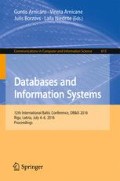Abstract
In an adaptive e-learning system an opportunity to choose a course topic sequence is given to ensure personalization. The topic sequence can be obtained from three sources: teacher-offered topic sequence that is based on teacher’s pedagogical experience; learner’s free choice that is based on indicated links between topics, and, finally, the optimal topic sequence acquisition method described in this article. The optimal topic sequence is based on previous learners’ experience. With the help of the optimal topic sequence method, data about previous learners’ course topic sequence and course results are obtained. After the data analysis the optimal topic sequence for the specific course is obtained based on the links between course topics. In this article the experimental test of this method is described.
Access this chapter
Tax calculation will be finalised at checkout
Purchases are for personal use only
References
Brusilovsky, P., Vassileva, J.: Course sequencing techniques for large-scale web-based education. Int. J. Continuing Eng. Educ. Life Long Learn. 13(1/2), 75–94 (2003)
Elouahbi, R., Abghour, N., Bouzidi, D., Nassir, M.A.: A flexible approach to modelling adaptive course sequencing based on graphs implemented using XLink. Int. J. Adv. Comput. Sci. Appl. 3(2), 7–14 (2012)
Fung, A.C.W., Yeung, J.C.F.: An object model for a web-based adaptive educational system. In: 16th World Computer Congress 2000, Proceedings of Conference on Educational Uses of Information and Communication Technologies, pp. 420–426. (2000)
Hrastinski, S.: Asynchronous and synchronous e-learning. Educause Q. 31(4), 51–55 (2008)
Huang, S.L., Shiu, J.H.: A User-centric adaptive learning system for e-learning 2.0. J. Edu. Technol. Soc. 15(3), 214–225 (2012)
Jabari, N.A., Hariadi, M., Purnomo, M.H.: Intelligent adaptive presentation and e-testing system based on user modeling and course sequencing in virtual classroom. Int. J. Comput. Appl. 50(9), 23–31 (2012)
Madjarov, I., Betari, A.: Adaptive learning sequencing for course customization: a web service approach. In: Asia-Pacific Services Computing Conference, APSCC 2008, pp. 530–535. IEEE (2008)
Vagale, V., Niedrite, L.: Learner model’s utilization in the e-learning environments. In: Čaplinskas, A., Dzemyda, G., Lupeikiene, A., Vasilecas, O. (eds.) Local Proceedings 10th International Baltic Conference on Databases and Information Systems, Materials of Doctoral Consortium, pp. 162–174. Žara, Vilnius (2012)
Vagale, V.: Eportfolio data utilization in LMS learner model. In: Hammoudi, S., Maciaszek, L., Cordeiro, J., Dietz, J. (eds.) 15th International Conference on Enterprise Information Systems, ICEIS 2013, vol. 2, pp. 489–496. SCITEPRESS, Portugal (2013)
Vagale V., Niedrite, L.: Learner classification for providing adaptability of e-learning systems. In: Haav, H.-M., Kalja, A., Robal, T. (eds.) 11th International Baltic Conference, Databases and Information Systems, Baltic DB&IS 2014, pp. 181–192. TUT Press, Tallin (2014)
Vagale, V., Niedrite, L.: Learner group creation and utilization in adaptive e-learning systems. In: Haav, H.-M., Kalja, A., Robal, T. (eds.) 11th International Baltic Conference on Databases and Information Systems, Baltic DB&IS 2014. Frontiers in Artificial Intelligence and Applications, vol. 270: Databases and Information Systems VIII, pp. 189–202. IOS Press, Amsterdam (2014)
Vassileva, D.: Adaptive e-learning content design and delivery based on learning styles and knowledge level. Serdica J. Comput. 6(2), 207–252 (2012)
Author information
Authors and Affiliations
Corresponding author
Editor information
Editors and Affiliations
Rights and permissions
Copyright information
© 2016 Springer International Publishing Switzerland
About this paper
Cite this paper
Vagale, V., Niedrite, L. (2016). The Application of Optimal Topic Sequence in Adaptive e-Learning Systems. In: Arnicans, G., Arnicane, V., Borzovs, J., Niedrite, L. (eds) Databases and Information Systems. DB&IS 2016. Communications in Computer and Information Science, vol 615. Springer, Cham. https://doi.org/10.1007/978-3-319-40180-5_24
Download citation
DOI: https://doi.org/10.1007/978-3-319-40180-5_24
Published:
Publisher Name: Springer, Cham
Print ISBN: 978-3-319-40179-9
Online ISBN: 978-3-319-40180-5
eBook Packages: Computer ScienceComputer Science (R0)

